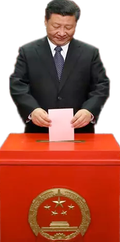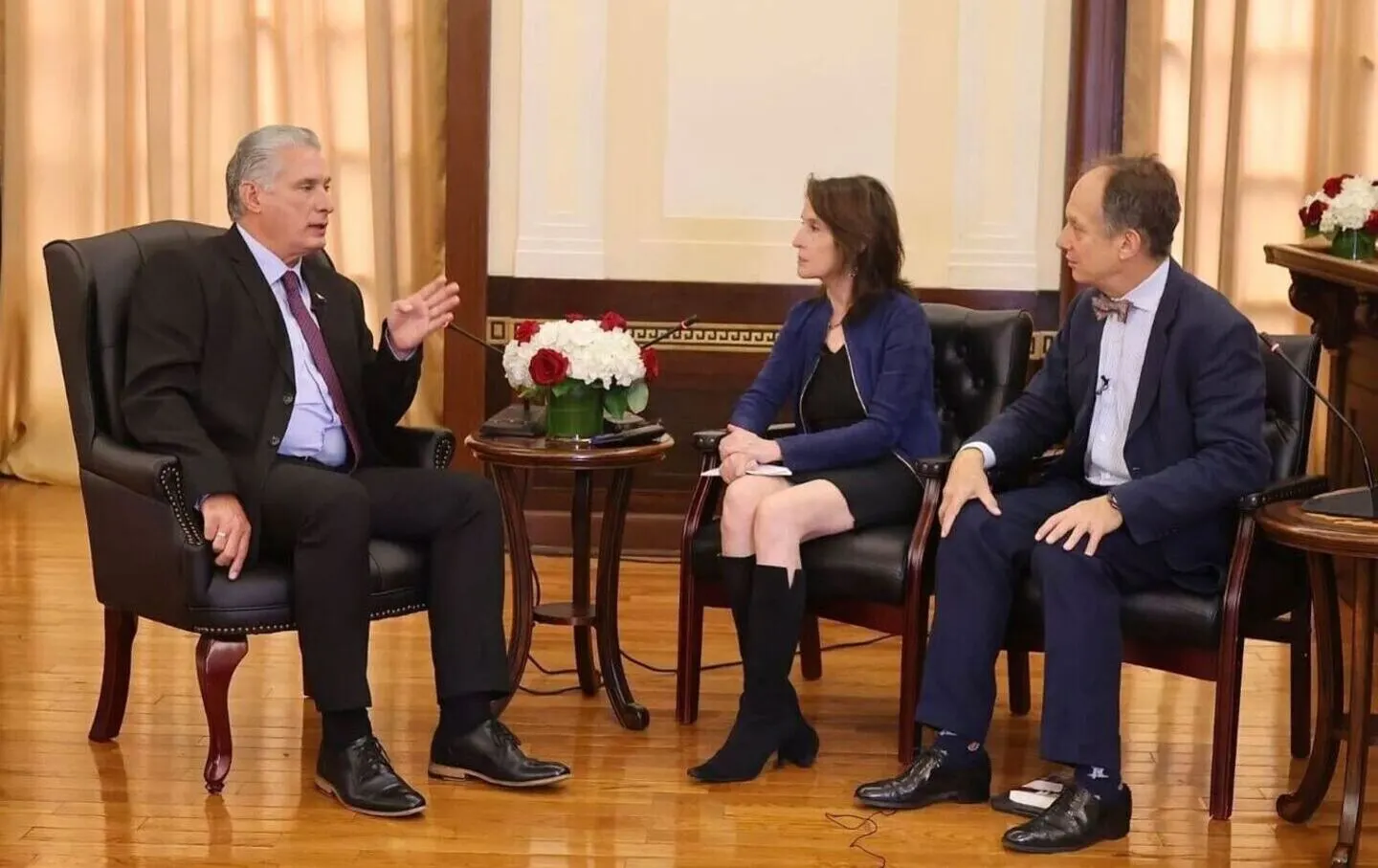- cross-posted to:
- [email protected]
- cross-posted to:
- [email protected]
For the first time in history, the president of Cuba sits down with a US outlet to share his thoughts on the future of Cuban socialism, the US blockade, and the economic difficulties facing the island nation.
In late September, The Nation’s publisher, Katrina vanden Heuvel, and its editor, D.D. Guttenplan, met with Cuban president Miguel Díaz-Canel for an exclusive interview in New York.
It was the president’s first-ever interview in the United States. They discussed the economic crisis facing his island nation, the future of its socialist model, and the impact of continued hostility from Washington.
read more: https://www.thenation.com/article/politics/interview-cuban-president-diaz-canel/
archive link: https://archive.ph/4Aady
Seems good. Nothing he’s saying glaringly scares me.
Not sure what the goal is here? Seems like this is aimed at getting more of the soft-left on Cuba’s side and building on the already strong international support. I’m not really convinced that any amount of international or domestic pressure can convince the american bourgeoisie to open up though.
If Cuba had something that America needs it would have a position of far greater capability to negotiate, like Venezuela with their oil now getting engagement from the US because of the situation in Ukraine and the Middle East. This might be an unpopular opinion here but if I were Cuba I’d probably look at niche manufacturing in the world and see whether it is possible to corner one of the things currently manufactured in China that America needs. They would potentially open up to Cuba if it served their goals of disconnecting from China.
Technically they already do have something the US citizens desperately lack, healthcare services. They’re the country with the most doctors per capita in the world, and regularly strikes deals with other poor countries for health and medical personnel aid. It just so happens that the US ruling class is more than happy to let their citizens die or go bankrupt through healthcare.
Yeah there’s not a people-based approach here. The US doesn’t care about people.
Material things though? Circuitry? Chips? I don’t know, something important that currently is only made by China that could be replaced by Cuba could result in a softening of relations. I understand this is not as easy as it sounds to do with no supply chains and it would be in competition with China too who can do everything at scale. However I think the US might be willing to take something that costs more than China if it’s closer to home and also something strategically important in the event of disconnecting.
Yeah at this point I don’t think the blockade serves any critical interest of the American bourgeoisie anyway. And also now that Florida is no longer really all that competitive for Democrats, if Cuba can provide something that the Americans want I could see the embargo lifted.
They could also try and work with cruise lines and hotel operators to lobby the government. Maybe allow US companies to operate the hotels under contract but not own the buildings or something?
Seems like he’s pushing a sort of Dengist line, saying that they want foreign investment ala China.
There’s no such thing as “Dengism.”
I think this is splitting hairs. Ok so what Deng did isn’t a different line to ML theory but when someone says “dengist” I feel like we all understand they’re referring to the policy of opening up.
I kind of understand the desire for this not to be viewed as separate or radically divergent to ML theory but it’s an easy way to talk about “policy that was implemented during Deng’s time as leader”.
I don’t think so.
When someone says “Dengist,” they’re a Maoist and think that what Deng did was “revisionist” or somehow different from ML theory.
It’s a loaded term and was meant as such.
im not a maoist, mao is cool tho. i stan cuba hard, and when china improves their lgbt laws in 10 or so years ill be an excessive pro-china bot
Alright, just making sure. Thanks!
There’s no way she meant it in a shitty sectarian way, and being this knee jerk to a term used commonly on this site in the way comrade Awoo described does a disservice to the above average leftist discourse here
I am not.
ok, i stand corrected, he supports Xi Jinping Thought with Cuban Characteristics

Whatever.
I’m afraid to read.
It’s actually really good, the last question is dumb as fuck though. They ask if he’s seen Barbenheimer.
Overall this is an incredibly softballed interview where the only minor pushback he got was on them questioning how state and private industry work together to which he responds:
However, the non-state sector, which has more possibilities to import despite the blockade, links up with that state entity, and together, they develop productive activities and services that ultimately benefit the people.
Along with explaining that a large amount of the private sector in Cuba is cooperative.
Along with explaining that a large amount of the private sector in Cuba is cooperative.
I’ve been thinking a lot recently about how to develop the productive forces in early stages of socialism in countries that are not transitioning out of the highest stages of capitalism, without just replicating most capitalist forms. I feel like cooperatives might be a good solution. The challenge is I don’t see how cooperatives would be adept at increasingly investing in capital that reduces labor like how a capitalist would, but idk these are just some half-baked thoughts.
That’s where the state comes in. The cooperatives usually lease labor saving equipment from the state who then purchases the goods produced by the cooperative. China and Cuba both follow this model (though mostly through agricultural cooperatives). I think that outside heavy industries, development can be bootstrapped by creation of a robust open public research and development sector and investment in cooperatively run light industrial shops that apply that research on a small scale.
Essentially allowing cooperatives to tap the national (or global) research space and find ways to apply that research outside large scale production. Then the state can take those developments and add the scale of that smaller industry expands, convert it to a nationalized monopoly.
That model is essentially how open source works, except that labor is not being exploited for the common advancement of society, but as a way for capitalists to steal labor.
It’s also worked for development of regional agricultural production in China and Cuba.
Man I definitely want to learn more about agriculture cooperatives in China and Cuba. I’ve been stuck on this “agriculture under socialism is really hard to figure out” kick for a while (because I’ve been reading too much about 1920s & 30s USSR history, frankly)
The Cuban Center for the study of Apiculture is a good start. These bees are controlled by a state organ, but they’re moved around and taken care of to allow for farmers to come get them from essentially “bee banks” to help pollinate their crops.
As you can see, each individual Apiary uses specialty methods developed for the types of bees they have in their region. So they all have some form of independence to do their work in a specialized way while all this knowledge is then aggregated by the state body and worked back into the education system.
I believe that Cuba has an extensive “trade school” system where farmers can go and learn about best practices and get the most up to date information coming out of state research bodies like this for free.





